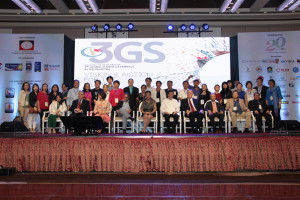Community News
BalikBayanihan: The global Filipino’s journey from diaspora to Philippine development

Delegates of the 3rd Global Summit
MANILA – In 2014, around 10.5 million Overseas Filipinos (OF) working or residing in more than 200 countries had remitted an astounding billion or P1.
2 trillion to the country, according to the World Bank. And yet, the Commission on Filipinos Overseas (CFO), the primary government agency tasked to protect and uphold the rights and welfare of OFs, says there’s a much more important currency that global Filipinos are sending back. They are social remittances.
Social remittances are initiatives or a way of living of Global Filipinos that create opportunities for people other than their own families. “While we appreciate the remittances of our kababayans abroad that contribute to the country’s GDP while helping support their families, their will to share their talents and passions within the homeland is their greatest gift,” said CFO Secretary Imelda M. Nicolas.
Secretary Nicolas encourages the use of the term “Overseas Filipinos” instead of “OFWs” to include people who live abroad but not for work—unlike the OFWs or Temporary Migrants who are expected to return to the Philippines after their employment contract ends.
There are also the permanent residents and naturalized citizens of other countries (Permanent Migrants), and those who are not properly documented with residence or work permits and may be overstaying in a foreign country (Irregular Migrants).
As of December 2012, of the 10.5 million Overseas Filipinos, 47 percent (or 4.9 million) are Permanent Migrants, 40 percent (or 4.2 million) are Temporary Migrants and 13 percent (or 1.36 million) are Irregular Migrants.
CFO organized the 3rd Global Summit of Filipinos in the Diaspora on Feb. 25 to 27, at the Manila Hotel, a fruitful interaction of around 600 Filipino diaspora partners and community leaders to discuss “Vision and Action for the Filipino Diaspora for 2015 and Beyond,” this year’s theme.
“We feel that we should help the community leaders of our global Filipinos to be empowered, engaged with both their host and home countries, capable of sustaining their goals and maximizing their own strengths and opportunities for partnership with each other, other diaspora groups and multi-lateral organizations – way beyond this Administration,” said Secretary Nicolas.
Some of the speakers at the 3rd Global Summit were technology incubation expert Earl Valencia and world-renowned cancer specialist Dr. Samuel Bernal.
A graduate of Cornell University and Stanford Graduate School of Business graduate, Valencia was the Business Incubation Manager of Cisco’s Emerging Technologies Group in Silicon Valley before he went back to the Philippines before he turned 30 to co-found IdeaSpace Foundation, an incubation and acceleration initiative for technology entrepreneurs which has touched over 100,000 lives in less than three years.
“Coming back to the Philippines after more than 10 years in the US is one of the most difficult yet rewarding decisions for me and my family,” said Valencia. “We did it because we hope that maybe in our lifetime, our kids will say they are from the Philippines in the US or in Europe and people will remember our country as a place where great innovators live.”
Another global Filipino who is making a name for the country is Dr. Samuel D. Bernal, world-renowned cancer specialist and regenerative medicine pioneer, who is also a lawyer specializing in Regulatory Law and Medical Malpractice, a PhD and MBA degree holder, the head of the Institute of Personalized Molecular Medicine and consultant adviser for Regenerative Medicine Program of The Medical City, Professor Emeritus of Medicine at the University of California, Los Angeles (UCLA), and the author of various books on oncology and cancer research, and a director of various business organizations and foundations. He is also a cancer survivor.
Dr. Bernal is a devoted advocate of personalized, customized diagnosis and care of patients. He won a landmark case in 2008 representing a patient who died in the hands of doctors who used standard-of-care procedures and population-based statistics instead of looking at the unique case of the patient.
“The enduring feature of the Global Summit has always been the sharing of stories among overseas Filipinos themselves – about their experiences, their successes and their dreams for the future,” said Secretary Nicolas. “These stories create the bridge towards stronger networking and diaspora engagement.





















